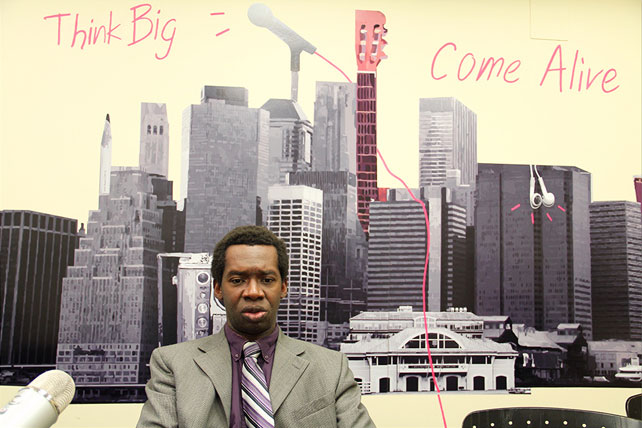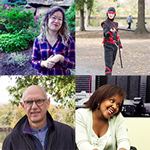Faces Behind the Screen: Chris
Quick Links
<< Return to all “Faces Behind the Screen” stories
Sign language interpreters inhabit an extremely significant role within Deaf and hard of hearing communities. They facilitate communication between Deaf people who sign and hearing people who don’t. But, at what point in one’s life does one say to oneself, “Sign language interpretation is what I want to do for a living”?
One would imagine that most interpreters learn their trade in adulthood — during college, or maybe later, in a certification program. But for some, it’s just a matter of where your teacher decided to seat you during class in elementary school.
Chris Robinson is the Outreach and Training Coordinator for Boston University’s Disability Services Office. His job is to provide training and resources to members of the BU community to ensure that online, in class, residential and student life environments are accessible. Today, Chris is fluent in American Sign Language (ASL) thanks to his exposure to and subsequent engagement with Deaf people at an early age. It’s also simply a byproduct of the inherent boredom of being an only child.
Tell us the story about how you learned sign language.
My third grade teacher was trying to keep separate two other kids in the class. And these two other kids apparently were signing to each other. They come from Deaf families, so their first language was sign language. And they were basically talking to each other during class, essentially cheating or playing around, goofing around, not paying attention.
And I was the way to keep them apart by being actually put right in the middle of them during third grade. And just like you would have neighbors who might speak Spanish or a different language just by proximity, I started to pick up American sign language.
I learned sign, because I wanted to rat on them. I wanted to tell their parents what they were doing at school. I didn’t have any siblings to rat on.
…And I would tell their parents everything they were doing the best way I could — finger spelling initially. And then they would teach me the signs.
“I was the only black kid in my class. And they were the only two kids that were different than the other kids…”
Did you feel like a sort of pioneer in breaking down those language barriers?
It comes back to me being a pioneer of finding out anything that’s different other than myself. I’m just very nosey. So, I didn’t really know any other kids in my class that took on sign language or learning the language to get into the world of Mike and Danny.
I was the only black kid in my class. And they were the only two kids that were different than the other kids, because both of their parents had disabilities as was perceived by that community. So, all three of us were kind of outliers. We just kind of gravitated to each other.
You are very involved with ASL in the local theatre community. How did that start?
I was at an event here in Boston called Disability Pride Day. And I was out there, having fun, kind of rocking out. It was very much Woodstock meets disability meets social justice. It was out there in Copley Square– beautiful day, beautiful weekend.
…One of the folks there was a Deaf woman who came up to me. She saw me just kind of signing along to the music, and because I just having fun, she asked me if I liked the band. I said, yeah, I like the band. I follow them, go to Cambridge [often], see where they play. She said, “OK, well, why don’t you get up there on stage and start signing some of the music?”
Not only was I an only child, but I was a cocky only child. So, I got up on stage and started signing along, kind of dancing it along with the interpreter.
Fast forward a year and a half later, I find out that that woman was the Executive Director of a disability services agency here in Boston. And she hired me with the provision that I would take training to become an American sign language interpreter based upon the talent that I exhibited that day.
“Not only was I an only child, but I was a cocky only child. So, I got up on stage and started signing along, kind of dancing it along with the interpreter.”
What is a common mistake hearing people make when interacting with Deaf people?
There are tons of mistakes, but humans make mistakes in so many interactions because of fear, fear of getting embarrassed.
My experience here in the Northeast is that people interact, introduce each other, make connections based upon education. Where’d you go? Where’d you go to school? You know, that’s the kind of thing that brings people together because we’re in an academic hub [in Boston].
I’ve often seen people, hearing people, interact with Deaf people and start the conversation not about their academic experience. They’ve actually pushed that aside and started inquiring about how long have they been deaf. Was there an accident? It becomes very clinical. It becomes very medical. I find that problematic, kind of condescending.
What is something you wished hearing people knew about Deaf culture?
What I wish that population, all hearing [understood], is that within the deaf community, there are other communities. There are so many intersections of identities within the deaf community.
What I see in the media, what I see in academia as well, is that we look at the Deaf community versus the hearing community, and that those are the two cultures that exist. And that’s it. And frankly, what that defaults into many people thinking is that there is white deaf American culture, and then there’s hearing American culture.
“What I see in the media, what I see in academia as well, is that we look at the Deaf community versus the hearing community, and that those are the two cultures that exist.”
And then that’s it versus talking about the many identities within the deaf community: women, women of color, LGBTQ, Southern versus Northern, African-American Deaf, African Deaf, two completely different things. And then there are smaller pockets– Nigerian versus Liberian versus a Deaf person from Senegal and their educational background.
What can hearing people do to be good allies for Deaf people or those who have hearing loss?
Make mistakes often, and revisit them.
The interaction that you have with one deaf person today is the interaction you had with that deaf person today. Take away what you take away from that conversation, and then revisit that conversation, because you’re going to get a different identity from that very same person tomorrow. And then have conversations with other deaf people.
So, I would kind of truncate that [with this]: take risks and be okay with making those mistakes. In academia and in the corporate world, in media, making mistakes is exploited. Look at movies and film. You stay for the outtakes, for the bloopers. There are TV programs about the bloopers, and we make fun of that. But we don’t want to get caught in one, right?
So, all of that that gets into the back of our minds, about avoiding making those mistakes, filters into those interactions that we have, I guess, in the classroom or with deaf people we work with. So look — pursue making the mistakes, get them published, get on video making mistakes, and I think you’ll be a lot more comfortable in terms of any interaction, let alone just deaf people.
“Don’t bolt it on. Build it in.”
When you think about the internet and website accessibility, what is your personal philosophy about progress in that area?
I don’t know who authored it, but it’s this phrase, “Don’t bolt it on. Build it in.”
So, when it comes to web accessibility, our interest in accessing information is not just us consuming that information, but [WCAG] 2.0 and beyond to create information, create content.
There’s got to be somebody or people out there beyond that field, this artificial field of the web, who has a paradigm shift or have a world view that is the tipping point for the cure to cancer to create a new metaphor for combating racism, sexism. And it’s just a matter of interaction and conversation in which we can evolve just by getting exposed. I would call it ‘vaccinated’ by a new idea, right?
And if we have all these barriers in place, so those ideas can’t cross-pollinate, then we’re killing the bees of our ideas, and we’re not going to survive. Cognitively and, ultimately, physically, we’re not going to survive.
“If we have all these barriers in place, so those ideas can’t cross-pollinate, then we’re killing the bees of our ideas, and we’re not going to survive.”
Do you have any good advice for our readers?
Good advice, I think, should eventually become obsolete. Good advice should eventually serve its purpose and go away so you don’t need that advice anymore.
…I would like to think that we’re working toward making disability services obsolete. I would think that we’re working toward sign language interpreters becoming obsolete. Not necessarily I don’t want to put you guys out of business, but we’d like to think that companies that have to be brought in because media is inaccessible, they’re not compliant, or the organization just didn’t think about a critical population in the world. The attitude that comes with needing closed captioning companies or companies that are interested in accessibility tend to have a need for them to come in, I would like to see that need go away.
So in my job, in every action, every decision, I’m trying to figure out, how can I make myself obsolete?
—
NOTE: This page was originally published on 2/16/2017 and was updated 1/12/2018.
We want to extend a huge thank you to Boston University and the Howard Thurman Center for Common Ground for hosting this series of interviews.
Faces Behind the Screen is a storytelling project focusing on members of the Deaf and hard of hearing community.





